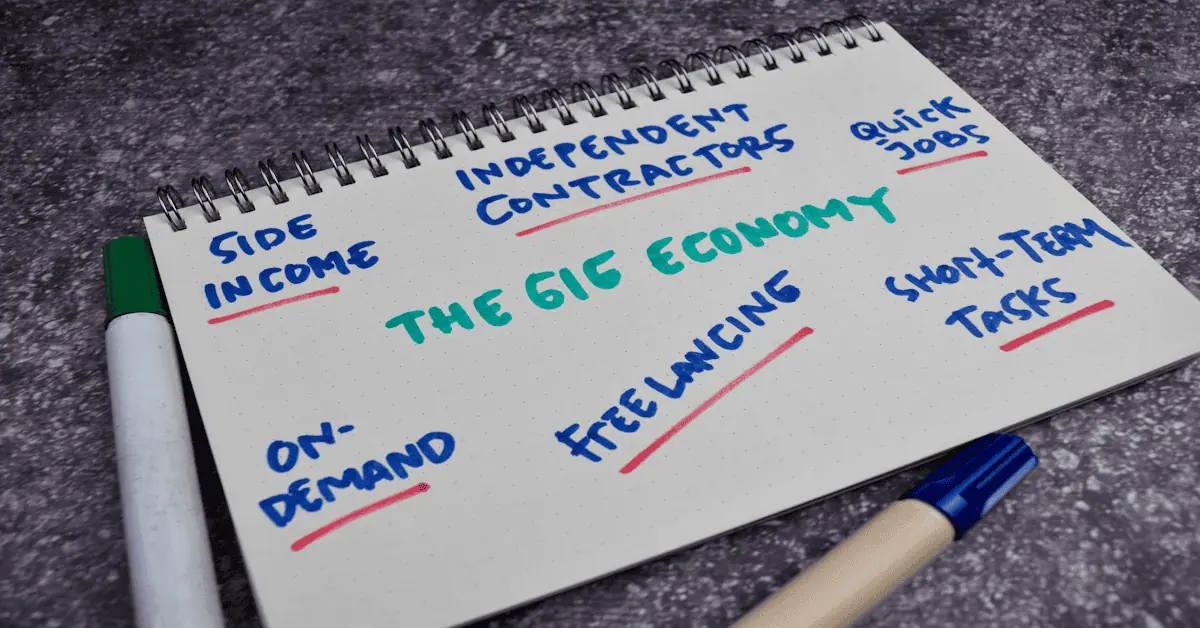Best Gig Work Opportunities for Retirees: Your Guide to Profitable Side Hustles

Gig work lets you earn extra income while keeping your lifestyle flexible. This article will walk you through the gig work opportunities for retirees and how to get started and succeed at them.
Quick Facts
Gig work gives you flexible schedule, extra income and social engagement so you can balance your personal commitments with work.
Popular gig work for retirees are rideshare, pet care, virtual tutoring and freelance consulting so you can choose roles that fit your interests and skills.
Effective management of gig work involves setting realistic income goals, tracking earnings and expenses, and staying informed about tax obligations to maximize financial outcomes.
Understanding Gig Work in Retirement

The gig economy has come a long way since it first started and is now more senior friendly. For retirees gig work offers flexibility, extra income and social connection. Unlike traditional jobs you can choose when and where you work so it’s easier to balance your new lifestyle with your professional interests.
The major benefits of gigs include flexibility. You have the ability to work an exact amount or as little as possible—you can fit it perfectly around your schedule, comfort zone, and personal fulfillment. This is quite nice for retirees with other preoccupations or who don’t want to be involved in anything stressful during a free time period. Apart from that, gigging has also become a helpful supplementary income to pay expenses when unexpected situations arise, for topping up retirement savings by working freelance, or simply as a way for retired people to continue finding purpose in independent work.
But there are also things to consider. Age discrimination and technology can be daunting but many gig platforms are designed to be user friendly and age inclusive. And understanding the tax implications and how gig work affects your retirement benefits is key. Being informed and proactive will help you navigate these challenges and get the most out of gig work. The legal classification of gig workers as independent contractors has big implications for retirees and affects their access to benefits and protections that employees get.
Benefits of Gig Work for Retirees
Gig work is great for retirees who want to stay busy, engaged and earn some extra cash. Here are the benefits:
Flexibility: One of the biggest advantages of gig work is you can choose when and how much you want to work. This means you can pursue other interests and activities and balance work with your life.
Supplemental Income: Gig work can give you the extra cash you need to cover expenses and live comfortably. Whether it’s for travel, hobbies or unexpected expenses the extra money can make a big difference.
Social Interaction: Many gig opportunities involve interacting with others which is good for mental and emotional well being. Whether you’re tutoring, consulting or pet-sitting these interactions can keep you connected and engaged.
Sense of Purpose: Retirement can leave a void in terms of purpose and fulfillment. Gig work can fill that gap by giving you meaningful tasks and projects to work on and a sense of achievement.
Variety: Gig work offers a wide range of tasks and projects to keep your mind active and engaged. Tutoring and teaching, pet-sitting and consulting there’s something for everyone.
Gig work for retirees:
Tutoring
Freelance writing or editing
Pet-sitting
House-sitting
Consulting
Top Gig Work Opportunities for Retirees

Gig work comes in many forms and interests and skills. One of the most popular is rideshare and food delivery. Platforms like Uber, Lyft and DoorDash have flexible schedules and you can earn money while meeting new people. Whether you like driving passengers or delivering meals, these platforms are easy to get started with.
But some gig work like rideshare and food delivery is still up for debate on minimum wage and worker benefits.
Animal lovers may enjoy pet sitting and dog walking. Apps like Rover and Wag connect pet owners with reliable sitters, you can earn money while spending time with furry friends. This type of work is not only fun but also flexible and you can choose your own hours.
Other great options are virtual tutoring and teaching on platforms like VIPKid and Chegg. If you have expertise in a particular field, freelance consulting can be a way to continue using your skills. And home-based customer service and virtual assistance to work from home.
These diverse gig work options ensure that retirees can find something that aligns with their interests and lifestyle.
Skills and Experience Required for Gig Work
While gig work can be a great option for people of all skill levels and experience, some gigs may require specific skills or experience. Here are some examples:
Writing or Editing: Gigs in this category may require strong writing or editing skills, as well as experience with content management systems. If you have a knack for words, this could be a perfect fit.
Graphic Design: These gigs often require experience with design software such as Adobe Creative Suite. If you have a creative eye and technical skills, graphic design can be a lucrative option.
Programming or Coding: Gigs in this field may require experience with specific programming languages or software development methodologies. If you have a background in tech, these opportunities can be highly rewarding.
Consulting or Coaching: These gigs may require experience in a specific industry or field, as well as strong communication and interpersonal skills. Sharing your expertise can be both fulfilling and profitable.
Customer Service: Gigs in customer service may require experience in customer-facing roles, as well as strong communication and problem-solving skills. If you enjoy helping others, this could be a great fit.
It’s also important to note that many gig platforms require workers to have a strong online presence, including a professional profile and portfolio. This helps you stand out and attract more clients.
Getting Started with Digital Platforms
Choosing the right platform makes all the difference. Start by listing your skills and interests and then research platforms that fit for a particular task. For example if you like driving then rideshare apps would be perfect. If you like working from home then virtual assistance or tutoring platforms.
Once you’ve chosen a platform make sure you have the necessary tools and technology for the job. This might be a reliable smartphone, computer and internet. Investing in the right equipment will make you more efficient and make gig work more enjoyable.
A good profile attracts clients and makes you different from the rest. Showcase your skills, experience and qualifications. Knowing the platform fees, payment systems and earning potential will help you set realistic expectations and manage your finances.
You can be a gig worker in no time.
Marketing Yourself as a Gig Worker

As a gig worker you need to market yourself to attract clients and projects. Here are some tips:
Establish a Strong Online Presence: Begin by crafting a professional profile and portfolio that highlights your skills, experience, and accomplishments.
This is your digital CV and can make a big impact on potential clients.
Develop a Personal Brand: Your personal brand should reflect your unique skills, experience and values. Consistently communicate this brand across all your marketing channels.
Use Social Media: LinkedIn, Twitter and Facebook can be great tools to promote your services and connect with potential clients. Share your work, join relevant groups and comment on posts to get noticed.
Network: Building relationships with other gig workers and potential clients can bring new opportunities. Attend industry events, join online communities and don’t be afraid to reach out to others in your field.
Develop a Pitch: Have a clear and concise pitch or elevator speech that explains your value proposition. This can be useful for networking and when reaching out to potential clients.
Create a Website or Blog: Having your own website or blog can showcase your work and services even more. It also gives you a platform to share your expertise and attract clients through content marketing.
Gig platforms: –
LinkedIn
Upwork
Freelancer
Fiverr
Website or blog
Managing Your Gig Work Schedule
Gig work and retirement lifestyle requires planning and time management. Start by setting realistic income goals and work hours that fit your needs and commitments. Remember the beauty of gig work is flexibility so use it to your advantage and create a schedule that works for you. Gig workers don’t get social security benefits which can impact your financial planning.
Seasonal opportunities and peak earning periods can affect your income. For example rideshare drivers may earn more during holidays or big events, tutors may see more demand at the start of the school year. Knowing these patterns will help you maximize your earnings.
Burnout is key to having a steady income and enjoying your gig work. Take breaks, prioritize self care and don’t be afraid to say no to gigs if you need rest. Good time management helps you achieve work life balance.
Safety and Security Considerations for Gig Economy Workers
As a gig economy worker, it’s essential to prioritize your safety and security. Here are some considerations:
Be Cautious with Clients: When meeting clients or working in new environments, always prioritize your safety. Meet in public places when possible and let someone know your whereabouts.
Use Reputable Platforms: Stick to well-known and reputable platforms and apps to find work and communicate with clients. These platforms often have built-in safety features and support systems.
Set Clear Boundaries: Establish clear boundaries and expectations with clients from the start. This helps prevent misunderstandings and ensures a professional relationship.
Protect Personal Information: Keep your personal and financial information secure. Use secure payment methods and avoid sharing sensitive data.
Occupational Accident Insurance: Consider investing in occupational accident insurance to protect yourself in case of an accident or injury. This can provide peace of mind and financial protection.
Some popular safety and security measures for gig economy workers include:
Background checks
Identity verification
In-app messaging and support
Emergency assistance programs
Occupational accident insurance
Maximizing Your Gig Work Success

To succeed in the gig economy you need to have a good reputation. Here are some tips to help you:
Deliver high quality work.
Keep high ratings to get more opportunities.
Respond to client feedback quickly.
Go above and beyond for clients.
By doing these you can improve your reputation and earn more in the gig economy.
Diversifying your income streams can earn you more. Try working on multiple platforms or offer additional services to get more clients. This will earn you more and be a safety net if one platform slows down.
Be safe and protect yourself. Use secure payment, don’t share sensitive info and be careful when meeting clients in person.
Tracking Income
You need to regularly document your income for an accurate record of income. This helps you manage your finances and be tax ready.
Apps or spreadsheets can help with multiple income streams. Digital tools make it more efficient and less error prone and gives you a clear picture of your finances.
Managing Expenses
Budgeting is key for gig workers. It helps them allocate for taxes, personal expenses and varying income. Having a separate account for business expenses makes it easier to track and manage costs.
Save all your work related receipts for tax time. Good record keeping helps you claim more deductions.
Tax Obligations for Independent Contractors
As a gig worker in the US you have to pay 15.3% self-employment tax on your net income. It’s recommended to set aside 20-25% of your profits for federal taxes so you don’t get surprised. If you earn above a certain threshold you have to pay estimated taxes quarterly to avoid penalties for underpayment. These payments will help you stay on top of your taxes and avoid year end tax bills.
Gig workers can also use various deductions such as car maintenance, gas, insurance, occupational accident insurance and home office expenses. These deductions can reduce your taxable income so it’s important to keep track of all your work related expenses.
Overcoming Challenges and Staying Motivated as a Gig Worker
As a gig worker you will face different challenges and obstacles. Here are some tips to overcome challenges and stay motivated:
Set Clear Goals: Set clear goals and priorities for your gig work. This will help you stay focused and motivated and give you direction.
Create a Routine: Having a routine and schedule will help you stay organized and productive. Plan your work hours, breaks and personal time to have a balance.
Self Care: Taking breaks and self care is key to avoid burnout. Make time for things that relax and recharge you.
Get Support: Connect with other gig workers or mentors for support and advice. Sharing experiences and challenges is super helpful.
Continuous Learning: Keep learning and developing your skills and knowledge to stay ahead in the gig economy. Take courses, attend workshops and stay updated with industry trends.
Celebrate Successes: Acknowledge and celebrate your successes and achievements. This will boost your morale and keep you motivated.
Some other ways to stay motivated as a gig worker:
Setting daily or weekly goals
Using productivity apps
Making a vision board or goal map
Mindfulness and meditation
Joining a community
Do this and you’ll overcome challenges and be motivated.
Future of the Gig Economy

The gig economy is going to grow because of technology and changing workforce preferences. As more industries go digital, gig economy workers will make gig jobs more accessible across various job types in the service sector and labor market, and that’s why worker classification matters. Unlike standard workers who have stable employment contracts with long term employer-employee relationships, gig workers have less job security and fewer benefits.
The COVID-19 pandemic has accelerated the shift to remote work and gig platforms, so gig workers and independent workers have a bright future ahead of them with more opportunities and flexibility. But traditional employees who get steady pay, legal protections and benefits have a different set of advantages and challenges compared to gig workers. This is changing with new regulations to balance benefits and protections for all types of workers.
As the gig workforce grows, you need to stay on top of industry trends and new tech and platforms. By doing so you can be gig ready.
Summary
In summary gig work is good for retirees – flexibility, extra income, social interaction. Choose the right opportunities and manage your time well and you can have a happy and balanced retirement.
Tracking your income and expenses is key to gig success. Stay informed about tax obligations and use the deductions available to you to manage your finances and avoid surprises.
The future of gig work seems so bright, with continued growth and a change in opportunities. You can capitalize on these trends by being flexible and proactive to have a fulfilling experience in gig work.
FAQs
What are some good gigs for retirees?
The best gigs available to retirees are rideshare, food delivery, pet sitting, virtual tutoring, freelance consulting, and home-based customer service. Many of these can be flexible, going at your pace and accommodating your schedule.
How to get started on gig platforms?
You set this up for success first with gig platforms by identifying your skill and interest sets. Do your research about those particular platforms. In particular, create a stellar profile of yourself, learning fees associated and the pay structure or systems.
How to manage a gig schedule?
Manage your gig schedule by setting realistic financial goals and hours, maximizing seasonal opportunities for peak output. Prioritize self-care above burnout and balance all of life.
What are the tax implications of gig work on retirees?
Gig workers in their retirement are supposed to pay self-employment taxes and probably pay the estimated taxes if they’ve made over a certain income threshold. Use those deductions against your income to reduce the taxable amount.
What’s next for gig work?
At any rate, gig work stands fair with the changes in technologies and workforce that are foreseen to open opportunities in numerous industries. It is becoming more accessible, with more people joining the gig economy.
Disclosure: Some of the links in this article may be affiliate links, which can provide compensation to us at no cost to you if you decide to purchase. This site is not intended to provide financial advice. You can read our affiliate disclosure in our privacy policy.
